A Year in Review: The Most Memorable Moments of 2017
Ups and downs and major changes took our city by storm.
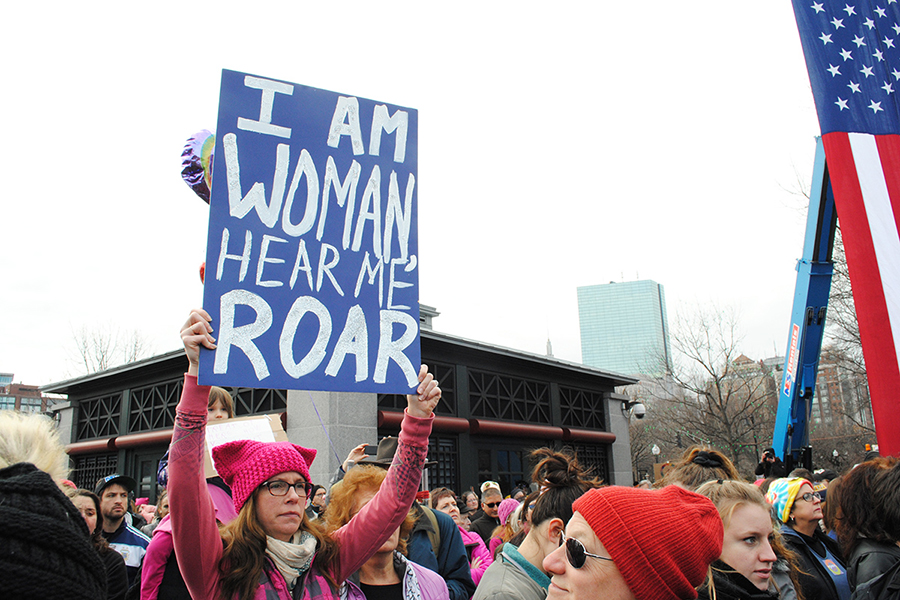
The 2017 Women’s March on Boston Common. / Photo by Madeline Bilis
Thousands Gather at the Boston Women’s March
Mayor Walsh Reaffirms Boston’s Sanctuary City Role
Massachusetts Is Dubbed the Best State in the Country
While you were complaining about the T and contemplating moving to a state with more predictable weather patterns, U.S. News & World Report was busy tallying up reasons why 2017 was a great time to be a Bay Stater. “Its vibrant academic environment, innovative and supportive health care policies and modernizing economy, measure for measure, make this small New England powerhouse with a population of 6.8 million the strongest state of all,” the publication noted when it awarded Massachusetts the top honor in the first of its now-annual “best state” rankings, which are informed by metrics collected in healthcare, education, crime, infrastructure, opportunity, economy, and government. In addition to its number one position overall, Massachusetts also came out on top in education and second in the healthcare category. “Massachusetts is a great place to live, work and raise a family because of the strength and character of all those who call the Commonwealth home,” Governor Charlie Baker said in a statement reacting to the award. “Everyone should be proud that Massachusetts continues to lead the nation in health care access and public education for all citizens, and our administration will continue to build on these accomplishments to bring more economic success to every corner of Massachusetts.”
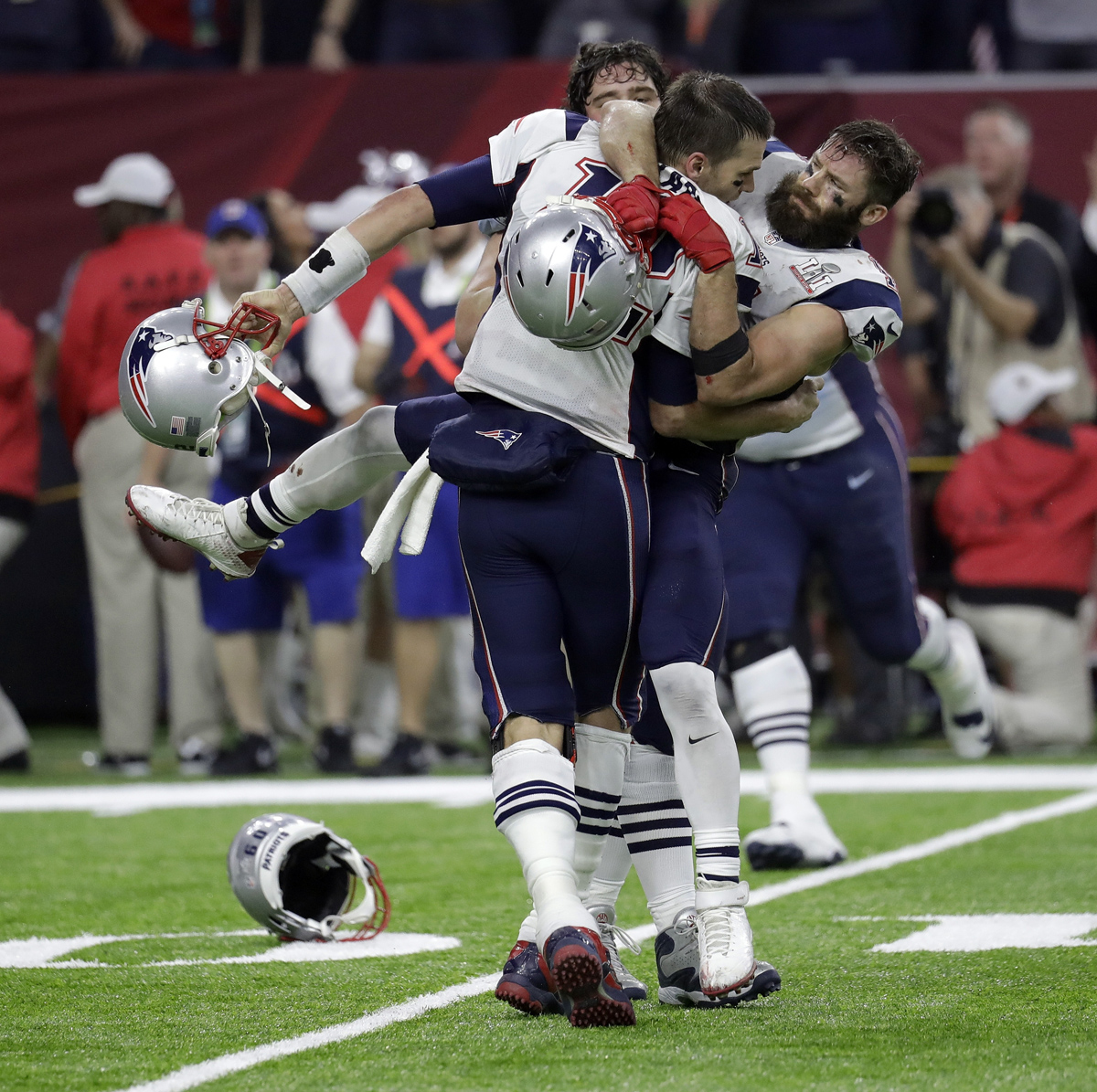
Image via AP
Patriots Win Super Bowl LI in Major Comeback
It’s the third quarter of the game. The Patriots trail the Atlanta Falcons by 25 points, Tom Brady is already being annihilated on Twitter, and Pats fans across the country are burying their faces in their hands. Cue the fourth quarter of Super Bowl LI, and everything changed almost as if by magic. By the time 58 seconds of play remained on the clock, the game was tied at 28-28. The team that hadn’t scored a single touchdown until the game’s second half then won in overtime, beating the Falcons 34-28, with help from two consecutive two point conversions, an unbelievable Julian Edelman catch, a touchdown from James White to put them ahead, and Tom Brady, well, finally giving us what we expect from Tom Brady. Two days later, the team hopped aboard their duck boat caravan to celebrate the team’s fifth Super Bowl win, the biggest comeback in Super Bowl history, and the first ever Super Bowl decided in overtime. Someone who had less of a blast at the victory parade: Charlie Baker, who was booed by the crowd at City Hall Plaza when Mayor Marty Walsh welcomed him to the microphone. The icy reception toward the governor followed criticism for being MIA at the Boston Women’s March, as well as at protests against the Muslim ban in Copley Square (albeit for a funeral, Baker later stated).

The South End Open Market / Photo by Sarah Fisher
The South End Open Market Says Goodbye
You might already have forgotten that the SoWa Open Market of today is not the original. The South End’s first artisanal market (in the same location, but not with the same owners) actually pitched its tents 2004, but things came crashing down in 2015 thanks to a bitter feud between the market’s organizer, Chris Masci, of New England Open Markets LLC, and the owner of the property, Mario Nicosia of GTI Properties Inc. The two parties split ways that year, but Masci vowed to keep his market alive, partnering with National Development on a new market: the South End Open Market. The new concept debuted on May 1, 2016 near Ink Block, the same day that Nicosia and GTI Properties opened SoWa Open Market, in the same spot it is today, and where Masci previously stationed his vendors. The following year the South End Open Market was supposed to move to Ink Underground, a new park located beneath the I-93 overpass, for the summer of 2017, but in April, Masci unexpectedly announced his market was calling it quits due to competition and overall confusion surrounding the new market. Prior to the news, several vendors had also defected from Masci’s South End Open Market to Nicosia’s SoWa Open Market. “We had built up a customer base over 13 years, and we only had six months to get the message about the new location out there and retrain people,” Masci told the Globe. “They just didn’t get it.”
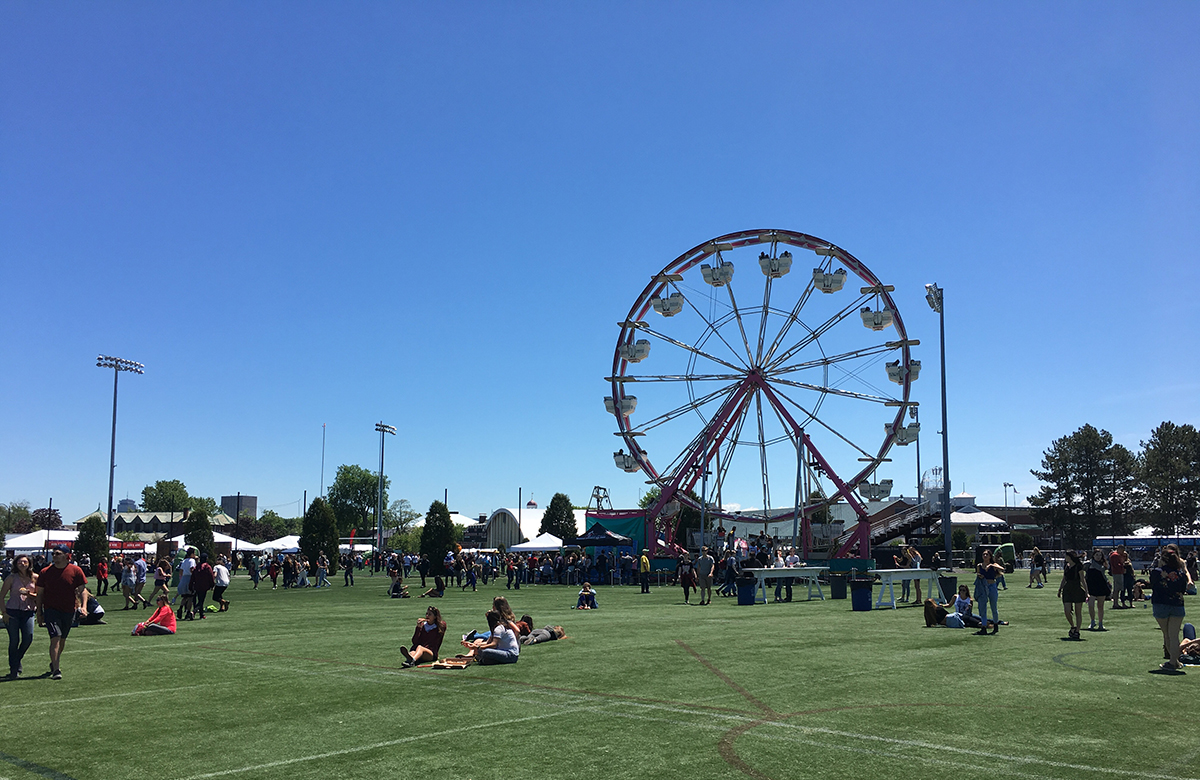
Boston Calling 2017/ Photo by Lisa Weidenfeld
Boston Calling Moves to Allston
On Memorial Day weekend, the 3-day festival bid farewell to the brick and concrete of City Hall Plaza and moved west to 16 acres of astroturf at Harvard University’s Athletics Complex. “Since 2013, we have enjoyed three successful years and six festivals at City Hall Plaza,” Boston Calling cofounder Brian Appel said in a statement when the move was first announced in May 2016. “We are so grateful to have had the opportunity to call City Hall the festival’s home. This change of location will allow us to expand and enrich Boston Calling while still keeping it proudly located in Boston.” In addition to the boom in acreage, the festival also grew from two stages to three, and expanded its lineup to 45 musical acts, including headliners Tool, Chance the Rapper, and Mumford & Sons, as well as 12 comedians, including Tig Notaro, Pete Holmes, and Hannibal Buress. Festival designer Russ Bennett (who also worked on Bonnaroo) mapped out Boston Calling’s new layout, which featured additional food and beverage vendors, and a Ferris wheel offering views of the entire festival and the city skyline beyond.
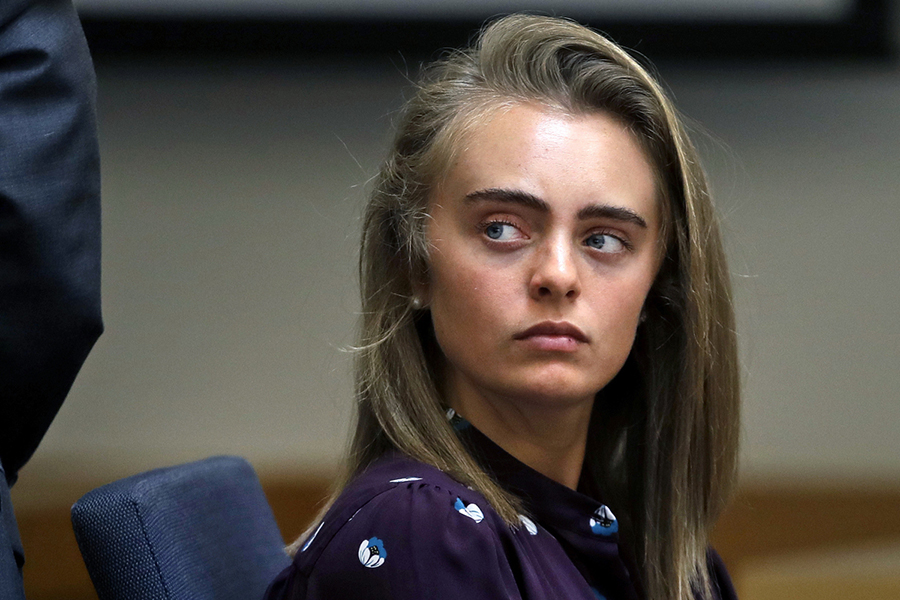
Michelle Carter / Photo via AP/Charles Krupa
Michelle Carter Found Guilty in Suicide Texting Case
Michelle Carter, the then 17-year-old Plainville teenager who encouraged her boyfriend Conrad Roy III to commit suicide in 2014 over text message, was brought to trial on June 5, 2017, over two years after she was charged. After waiving the right to trial by jury the day before the proceedings began at the Bristol County Juvenile Court in Taunton, Carter’s fate would be determined by Judge Lawrence Moniz. On June 16, Judge Moniz found Carter guilty of involuntary manslaughter, deciding that prosecutors had proved beyond a reasonable doubt that she was responsible for Roy’s death. In August, Moniz sentenced Carter to 2 1/2 years in prison, 15 months of which she’d have to serve. The case drew international attention and also spurred a two-part HBO documentary I Love You, Now Die: The Commonwealth V. Michelle Carter. It also set a new legal precedent that words alone result in culpability for another’s suicide. Carter has continued to appeal the case while currently serving her sentence, with the latest round potentially headed to the Supreme Court.
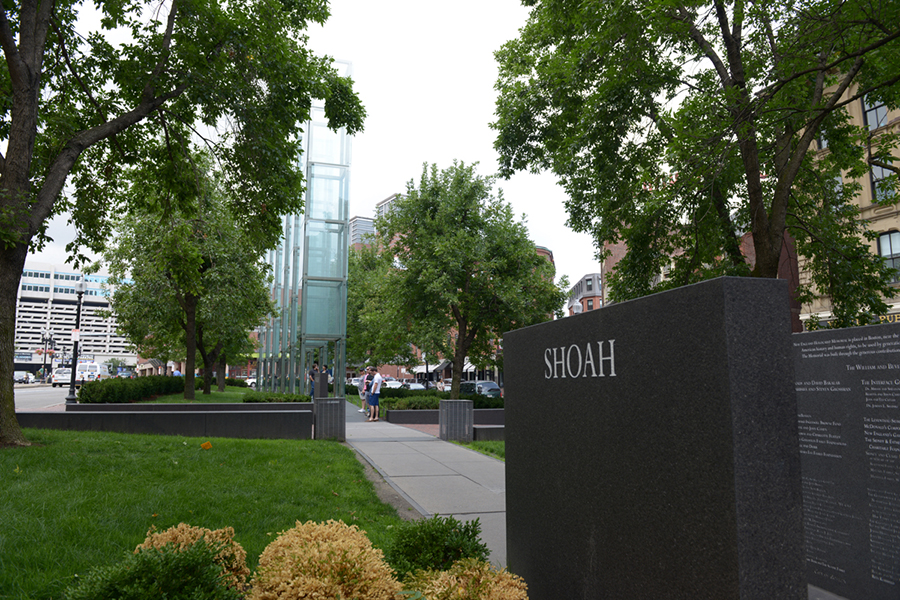
Photo by Lloyd Mallison
Boston Holocaust Memorial Smashed Twice
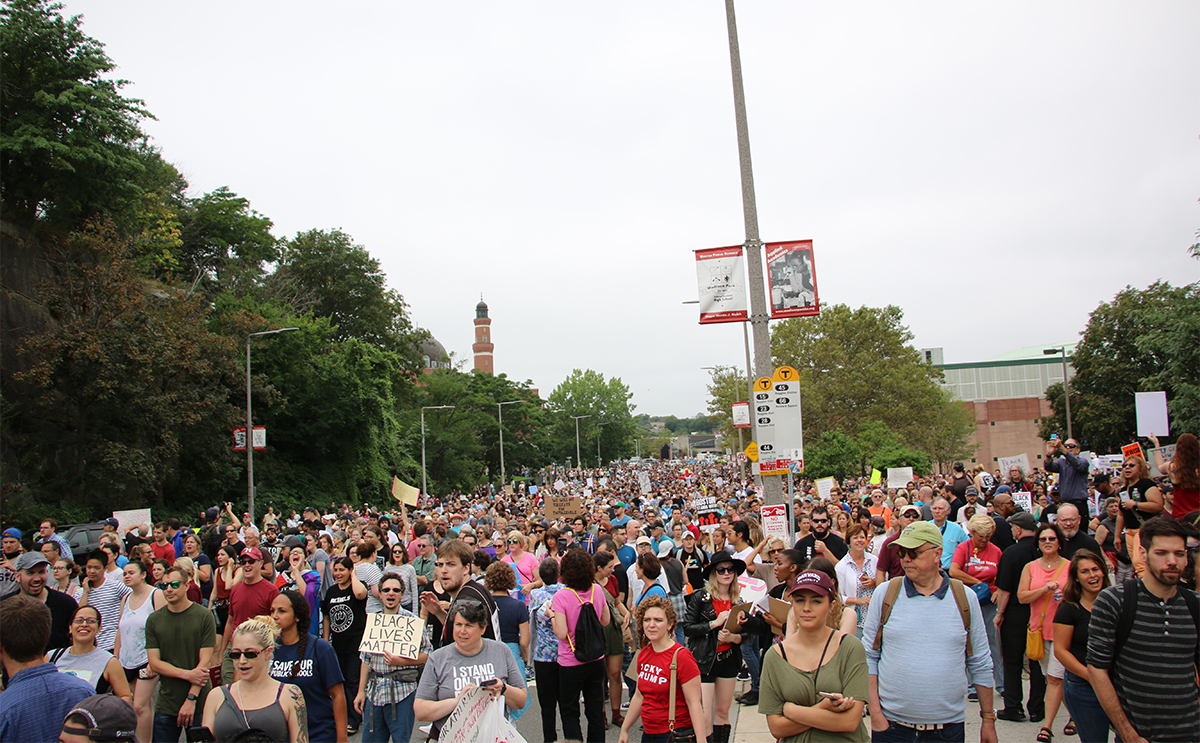
The Free Speech Rally protests. / Photo by Lisa Weidenfeld
Counter-Protesters Outnumber Free Speech Rally Attendees
Dunkin’ Donuts Starts the Transition to Dunkin
The Canton-based company made waves in August 2017 when Nation’s Restaurant News reported that the brand was experimenting with dropping the “Donuts” from its name at a new Pasadena, California location. “While we remain the number one retailer of donuts in the country, as part of our efforts to reinforce that Dunkin’ Donuts is a beverage-led brand and coffee leader, we will be testing signage in a few locations that refer to the brand simply as “Dunkin’,” the company said in a statement shared with the publication. The brand indicated they would be bringing the streamlined moniker to other locations as well, and, as promised, in December, the global chain opened Boston’s first “Dunkin'” on Tremont Street next to Boston Common. It also planned another for Quincy, where the company was founded. While the chain did not state whether the move would result in a permanent name change at the time, in September 2018, the company made things official and did away with “Donuts” for good.

